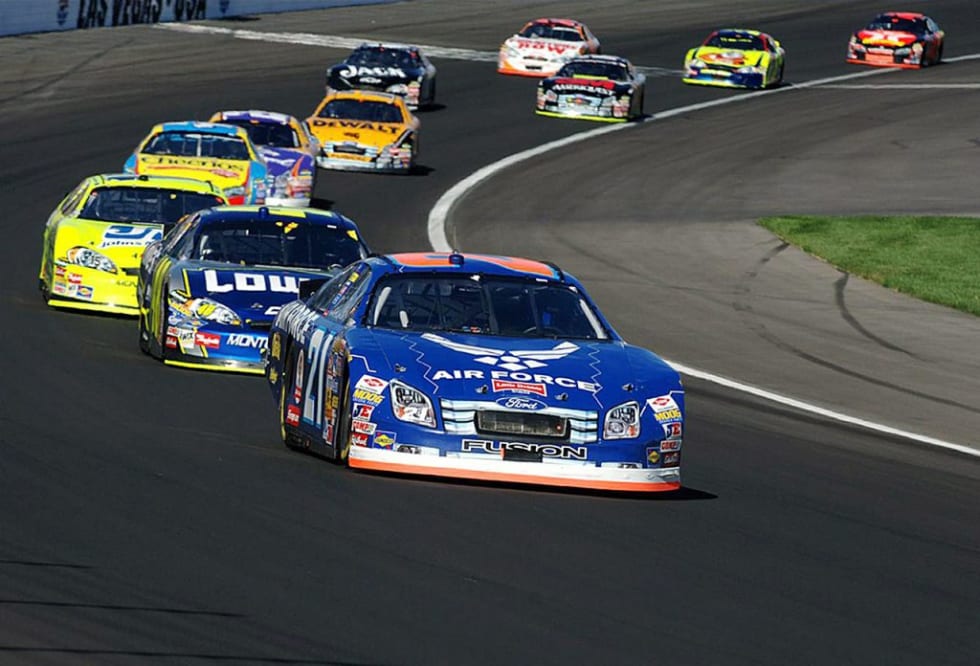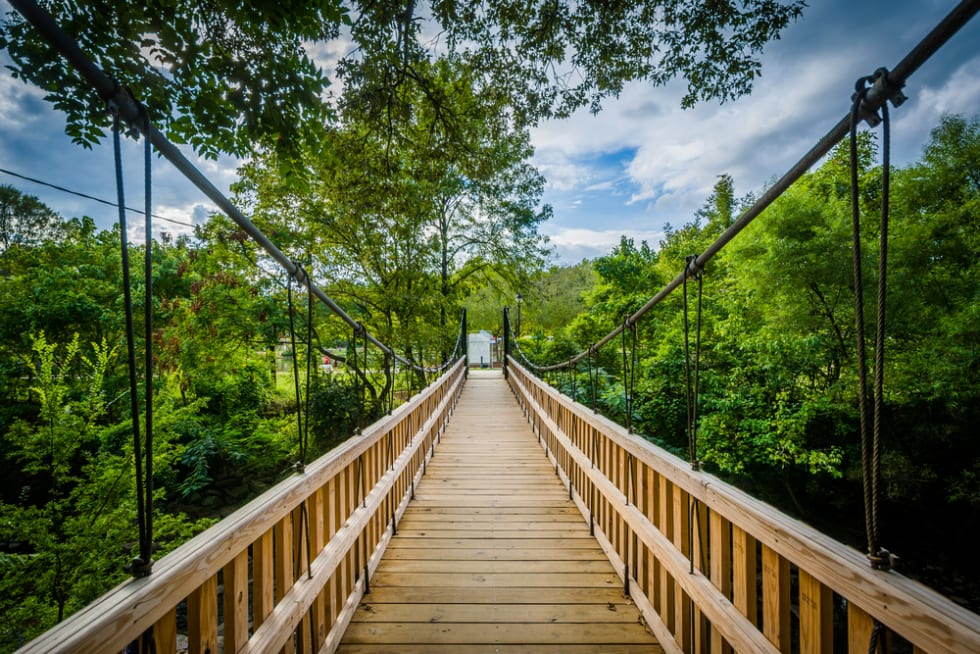- 38 units available
- Studio • 1 bed • 2 bed • 3 bed
- Amenities
In unit laundry, Putting green, Golf room, Wine room, Patio / balcony, Granite counters + more

Planning a move to Charlotte, North Carolina? The Queen City is known for its booming job market, a thriving sports scene, and a relatively affordable cost of living compared to other major metros. In this guide, we’ll walk you through 23 key things to know before moving to Charlotte so you can hit the ground running.
Key Insights for Renters Moving to Charlotte
Charlotte is affordable for a major metro: Average rents average $1,676 for a one-bedroom and $2,163 for a two-bedroom, making it cheaper on average than other major East Coast metros like Atlanta and Washington, D.C.
You’ll need a solid income to qualify: Using the 30% rule, you’ll need to earn around $67,000 for a one-bedroom or $87,000 for a two-bedroom.
Neighborhoods offer different vibes: Uptown puts you close to jobs and nightlife, while South End, Ballantyne, and Plaza Midwood appeal to young professionals, families, and creatives.
Transportation is car-heavy: Most renters drive, but CATS buses, the Lynx light rail, and bike-share programs make car-free living possible in certain walkable Charlotte neighborhoods.
Charlotte is growing fast: New residents mean rising demand for apartments, so renters should budget for competitive leasing and come prepared to move quickly.
Charlotte, the most populous city in North Carolina, is home to 874,579 people. Nicknamed the Queen City and the Hornet’s Nest, Charlotte is continuously ranked as one of its fastest-growing metro areas. And although Charlotte has earned a reputation as a millennial hub, it's still welcoming to college students, families, and retirees. Living in Charlotte comes with a healthy job market and business headquarters, fabulous food, varied entertainment, and perhaps best of all, affordable apartments and real estate. Before packing your bags and heading to the Southeast, here's everything you need to know before moving to Charlotte.
The cost of living in Charlotte is 2.5% higher than the U.S. average, with housing also 3.3% higher. Here's an idea of how much things cost when moving to Charlotte, as reported by Numbeo:
Recently, the average rent in Charlotte dipped to $1,676 for a one-bedroom apartment and $2,163 for a two-bedroom apartment. According to the data from our latest rent report, Charlotte’s rents are down 0.3% from last month and down 2.6% year over year.
To live comfortably in a one-bedroom apartment in Charlotte, we recommend following the 30% rule, which stipulates spending no more than 30% of your gross monthly income on rent. That means you should shoot for an income of at least $67,040 a year, or $32.23 an hour. For a two-bedroom apartment, you'll need to earn at least $86,520 a year or $41.60 an hour.
According to the U.S. Census Bureau, the median household income in Charlotte is approximately $80,581. By comparison, the median income is $70,804 in the rest of North Carolina.
Keep in mind that those figures are different from the basic living wage. According to MIT’s living wage data, living above the poverty threshold in Charlotte requires $26.59 an hour for a full-time employed single individual without children. You'll need more than that to afford debt repayments, nightlife, vacations, and restaurants.
One of the upsides to living in Charlotte, North Carolina, is the flat income tax rate of 4.50%. No matter what you earn, all taxpayers in the state pay this rate regardless of their filing status. North Carolina also boasts low property taxes and sales taxes near the national average.
North Carolina also has a few tax-exempt purchases, like prescription medications and some types of groceries. Property taxes are low, and sales taxes are average. There’s also no tax on Social Security retirement benefits.

Charlotte is attracting new renters from the South and across the East Coast. Trends show that people from Atlanta, Raleigh, and New York are all considering moving to Charlotte, North Carolina. On the other hand, renters in Charlotte are searching for apartments in Raleigh, Charleston, and Greenville.
For more information, read our Renter Migration Report.
If you're interested in moving to a new state, read our step-by-step guide.
Charlotte is home to a diverse and resilient job market. The city is the nation’s second-largest banking hub, anchored by the Bank of America and Truist headquarters, with a fast-growing fintech sector adding momentum. Health care, advanced manufacturing, and life sciences remain major Charlotte employers, while the city’s location makes it a key player in the transportation and logistics industries. Retail and services continue to provide steady opportunities, and the city is gaining recognition as an emerging hub for tech and artificial intelligence.
Charlotte is a driving town. However, you can get around quickly with public transportation options.
The least expensive option is a ride on Charlotte's public transportation run by the CATS, or the Charlotte Area Transit System. CATS operates both bus and rail transit in Mecklenburg County and the surrounding metro area.
CATS also runs the local Lynx light rail system. Fares run [$88 for an unlimited adult monthly pass]( https://www.charlottenc.gov/CATS/Ride/Rail/Gold-Line-Streetcar/Fares Susan Finch Susan Finch 1:28 PM Aug 14 source - https://iredelledc.com/life/charlotte-region/?utm_source=chatgpt.com Banner hidden Suggestion accepted Bullet removed Paragraph unindented new line Comment start Recently, the aver Comment end Entering page 5 of 18. Comment start CATS also run Comment end) for local buses and Lynx.
Uber and Lyft can help make forgoing car ownership a reality. Taxis are also available around Charlotte, although they’ll be the priciest option.
If you're a single adult with no children, MIT expects that you'll spend $9,887 for transportation in Charlotte (i.e., car ownership) each year. If you live in a household with two working adults and two children, you'll pay an average of $16,584 for car-based transportation.
Locals shrug when you ask them why most cities call their thriving business centers Downtown, yet Charlotte refers to theirs as Uptown. Some say that in the 1970s, a city council declared the shopping and business district would be called "Uptown Charlotte."

Yes, although New York takes the lead as a longtime banking leader in the United States (and the world), Charlotte ranks second in the country.
Charlotte and San Francisco are usually in heavy competition for second place. However, Charlotte holds the title with the extra nudge from Bank of America. It’s the largest bank by assets in the area.
Some of barbecue's earliest roots are traced to the 16th century on North Carolina's coast. Some believe Charlotte was even home to the first barbecue restaurant, with a classified ad dating back to 1899 in the Charlotte Observer promoting the "only barbecuer in Charlotte." Whether that’s true or not, what’s certainly true is that Charlotte is home to some of the finest barbecues in the country.
Charlotte is home to some of the most tantalizing and voluminous pimento cheese production in the Southeast. The local Ruth's Salads produces over 45,000 pounds of pimento cheese every week, placing Charlotte as a distinguished leader in the pimento cheese-selling market.
Yes, although California enjoyed the biggest gold rush in U.S. history, Charlotte was home to the country's first. And it wasn't a prospector or business giant who discovered the gold, either. Twelve-year-old Conrad Reed spotted a gold nugget while playing along Meadow Creek on his family's farm, which eventually became Reed Gold Mine.
Charlotte is home to one of the oldest Dairy Queen locations, featuring a two-sided sign. Cool off during Charlotte's hot, humid summers with a tasty treat and admire the vintage sign that's been standing since 1947.
When the British army arrived in Charlotte in 1780, they were in for an unwelcome surprise. The spirited local patriots pushed back until the British fled. The general called Charlotte a “hornet's nest of the rebellion.”
By 1892, the local baseball team picked up the nickname. The Charlotte Hornets then took the moniker when they became the city's first NBA team in 1988.
Charlotte is known for a reasonable cost of living in comparison to similarly sized metropolitan areas. It's only fitting that the very first Family Dollar Stores opened its doors in Charlotte. In 1959, retail entrepreneur Leon Levine launched the retail legend.
Yes, the city attracts racing enthusiasts to the Charlotte Motor Speedway. You’ll find events like the Monster Energy NASCAR Cup Series, the Xfinity Series, the Craftsman Truck Series, and car shows.
If you can't get enough in between races, you can also head Uptown to the NASCAR Hall of Fame and enjoy its $190 million entertainment center and museum.

Situated on the outskirts of Charlotte, the Whitewater Center set up shop to provide endless recreation, adrenaline rushes, and fun to the public. And as if that wasn't enough to add to Charlotte's bragging rights, the pumps are so powerful that they can fill an Olympic-sized swimming pool in less than 10 seconds.
Charlotte locals are loyal to their home teams and have plenty to root for. Football fans cheer for the Carolina Panthers at Bank of America Stadium, while the Charlotte Hornets stir up basketball lovers at Spectrum Center. Both stadiums are conveniently located in the city’s Uptown neighborhood, making it a convenient stop after work.
And although Charlotte doesn't currently have its own MLB team, it is home to a professional Minor League Baseball team, the Charlotte Knights, who play at Truist Field. Watching college ball is also a popular pastime, as the University of North Carolina Tar Heels are consistently one of the top teams in the country.
Don't forget to root for your favorite NASCAR driver at the Charlotte Motor Speedway. Catch the Bank of America Roval 400 or attend one of the speedway's racing schools, like the NASCAR Racing Experience and the Richard Petty Driving Experience.
Take a trip to historic downtown Salisbury for a picture-perfect downtown stroll. This national historic district features buildings like the former Rowan County Courthouse and the tower of the former First Presbyterian Church, dating back to 1891. Stay for the day to shop, dine, and enjoy the arts and culture scene, including independent galleries and theaters.
Get to know Charlotte’s gold rush roots with a trip to Reed Gold Mine. The discovery of gold, which led to nearly $1 million a year in estimated value, ushered in North Carolina's foothold as the leader in gold production until 1848. Admission to tour the mine is free, but from April 1 through October 31, you can spend a few dollars to pan for gold, weather permitting. Who knows, you might find your own gold nugget.
Charlotte holds the unique distinction of being the largest metropolitan area in the United States without a zoo. But locals don’t seem to mind. Instead, they head to the world’s largest natural habitat zoo located in Asheboro with 1,600 animals and 52,000 plants. The North Carolina Zoo is nestled on 2,600 wooded acres and focuses on conservation and encounters with wild animals in natural settings.
If you want to get out on the water, head about 40 miles north to Lake Norman. This massive lake offers boat, jet ski, paddleboard, and kayak rentals. You’ll also find scenic hiking trails and excellent shopping and dining at the nearby Birkdale Village. It’s the perfect spot for a day trip on a hot summer day.

Ever wanted to get your heart pumping with some whitewater rafting, hit the trails for mountain biking, sail on zip lines, and spend an hour stand-up paddleboarding? Charlotte has it all. The Whitewater Center offers 2,500 acres of outdoor activities for all skill levels, from amateur to competitive. The backdrop is also home to live music, outdoor festivals, and concerts like the River Jam concert series.
Charlotte has no shortage of independent or oversized venues like the historic Bojangles Coliseum and Ovens Auditorium, both welcoming major acts and Broadway shows. Together, the two make up the BOplex entertainment center for a multipurpose arena experience. When the Charlotte Hornets aren't playing, "the Hive" comes alive with major musical acts. For something a little lower-key, try the classic Smokey Joe's Café, which welcomes local and regional rockers.
Try the PNC Music Pavilion for national and international musical tours, or embrace the arts at the Belk Theater to hear the Charlotte Symphony play. Jazz lovers lounge at the Stage Door Theater in an intimate setting. There’s a long list of places to hear music around Charlotte, so take your pick from indie to rock and anything in between and discover your new favorite venues.
Charlotte is renowned for its family-friendly neighborhoods and high-quality schools. You don’t have to look far for recreation designed with kids in mind. Explore the Discovery Place Science with your kids for STEM education. Appropriate for all ages, Discovery Place Science offers programs, exhibits, and other special events. Families can learn more about how astronauts figured out the spacewalk, meet the on-site lab animals, and get answers to fascinating questions like why Mars is red.
Situated in the heart of Charlotte's cultural arts district, ImaginOn features a 102,000-square-foot facility that Livability ranked as the No. 1 children's library in the country. Over 300,000 people visit the facility annually, which boasts two state-of-the-art theaters and library space for kids aged 11 and under. Visitors also come to check out the teen-only library, multimedia studio, and exhibit space.
Charlotte’s thrill-seekers love Carowinds, a 407-acre amusement park. Enjoy tidal wave fun during summer months, the Carolinas' first double-launch roller coaster, and 14 other world-class roller coasters.
For a mini day trip with kids, head 30 miles northeast of Charlotte to the Gem Theatre, one of the oldest single-screen movie theaters in operation today. The theater also features a gorgeous lobby and 916 seats, along with a balcony section, delighting crowds gathering for cinema favorites.
Charlotte boasts a food scene that’s been heating up over the last decade. Locals choose from upscale pimento cheese to Carolina barbecue, farm-to-table fare, and everything in between. Eat brunch at Haberdish, savor Lowcountry-inspired fare at Gullah Meets Charlotte for salmon cakes at lunch, and dig into roasted duck breast at Haymaker.
For sophisticated dining, try BLT Steakhouse inside the Ritz-Carlton in Uptown for premium steaks and live jazz. Looking to celebrate? Hit the local gem, Barrington's, for bacon-wrapped quail, hickory nut gap pork chop, and spring mountain farms chicken. Locals looking for a hip atmosphere with a DJ booth and funky artwork dine at Soul Gastrolounge. Here you can sip bespoke cocktails while feasting on lamb lollipops, flatbreads, sushi, ramen bowls, and anchovy fries.
Like any metropolitan city worth its weight in gastropubs, Charlotte delivers on world-class beers, cocktails, and food. Go to the local favorite, The Cellar at Duckworth's, in the Fourth Ward for a speakeasy-inspired gastropub.
Browse a menu filled with grouper, steaks, chargrilled oysters, and pappardelle duck ragu. Wash it all down with signature cocktails or draft beer. Suffolk Punch Brewing is also a worthy stop for beer and seasonal ingredients infused into made-from-scratch sauces and stocks. Choose from flash-fried chicken, pulled pork shoulder, shrimp curry, and more.
Charlotte is known as one of the fastest-growing and most diverse metros in the Southeast. The city added over 15,600 new residents in just one year, marking a 1.7% increase, one of the largest numeric gains among all U.S. cities. The city’s international communities bring global perspectives to local neighborhoods, from Latino and Asian cultural hubs to a strong African American heritage. Annual festivals, multicultural events, and a food scene packed with global influences, ranging from Caribbean to South Asian, give Charlotte a cosmopolitan feel while staying rooted in Southern tradition.
With 23 reasons to move to Charlotte, you'll find a booming job market, sports, entertainment, and sports all at a lower cost of living than other major metros. Ready to move to Charlotte? Start apartment hunting with the Apartment List quiz and learn which Charlotte neighborhood is best for you. With us, you’ll spend five minutes and save 50 hours searching.
If Charlotte doesn't seem like the right place for you, consider other places to live in North Carolina.
Yes, Charlotte is considered affordable compared to other large U.S. metros. The cost of living is slightly below the national average, and rents are lower on average than in other East Coast cities like Atlanta and Washington, D.C. In 2025, the average rent in Charlotte is $1,676 for a one-bedroom and $2,163 for a two-bedroom apartment.
Charlotte is best known as the nation’s second-largest banking hub, home to Bank of America, Truist, and Wells Fargo’s East Coast headquarters. It’s also famous for hosting NASCAR, the Carolina Panthers, the Charlotte Hornets, and a growing food and craft beer scene. The city blends financial power with Southern culture and hospitality.
Yes, Charlotte offers one of the strongest job markets in the Southeast. Banking and financial services anchor the economy, but health care, logistics, advanced manufacturing, and tech are also major employers. New industries like artificial intelligence and fintech are creating even more opportunities.
Charlotte’s downtown is officially called Uptown, a name adopted by the city council in the 1970s. Locals embraced the change to promote a more positive, vibrant image of the business district. Today, Uptown is the heart of Charlotte’s finance, sports, and entertainment scene.
Charlotte has a humid subtropical climate with hot summers and mild winters. Summer highs often reach the 90s, while winter lows rarely dip below freezing. Residents enjoy four distinct seasons, making outdoor activities popular year-round.
Yes, Charlotte is a popular choice for families thanks to its affordable housing, good schools, and safe neighborhoods. Attractions like Discovery Place Science, Carowinds, and the Whitewater Center provide endless entertainment. The city also offers access to parks, day trips, and family-friendly communities.


In unit laundry, Putting green, Golf room, Wine room, Patio / balcony, Granite counters + more
In unit laundry, Nest technology, Golf room, Patio / balcony, Granite counters, Hardwood floors + more